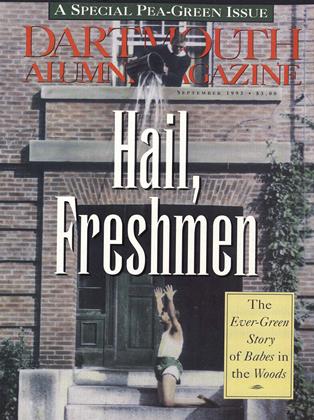"Idealists are sometimes ridiculed by cynics as hopeless, as starry-eyed, as unrealistic. But what did a cynic ever build?"
IN THIS SPECIAL issue of the magazine on students' first year at Dartmouth, I'd like to include some thoughts about another first year: the time when students commence their first lives in the wide wide world. Below is a short benediction I gave the graduating seniors at Commencement last June.
I EXTEND MY WARMEST CONGRATUlations to the Class of 1993 upon your graduation from Dartmouth. Yours was the second class to be admitted during my tenure as President, and I confess that I have taken a possessive pride in your many achievements. You entered as individuals; individuals still, you leave as a class and as members of an academic community.
You graduate within months of a stirring moment in public life, that moment when the President of the United States, in his inaugural address, challenged "a new generation of young Americans to a season of service"—not a season of comfortable complacency, not a season of privileged entitlement, not a season of precious isolation, but a season of service.
Embracing the ethic of service will not be easy. It may involve the deferral of present goals, settling instead for distant prospects. It surely will invoke that most demanding of qualities, the stamina of idealism.
Why, we may ask, should a nation or a President or a graduating college senior seek a season of such exacting demands? The reasons are several.
By serving others with humane respect, we touch their lives, and thus leave a legacy for the future—a legacy that may be passed on, in turn, to still further generations. That is as much permanence as one can hope to achieve in this world.
Service to others also brings out the best in each of us. It nurtures our selflessness and elevates our sense of human possibility. It reinforces our common bond of humanity by reducing the distance between "me" and "them," and creates what Robert Coles has termed "an incipient (if still fragile) 'us.'" Service only to oneself is not service at all.
Service often begins with idealism. But being ing an idealist is a demanding challenge. Idealists are sometimes ridiculed by cynics as hopeless, as starry-eyed, as unrealistic. But what did a cynic ever build?
Far from being unworldly, the best of idealists are engaged, pragmatic, and effective. Dorothy Day was an idealist. Would any regard her life's work as hopeless? Mother Teresa is an idealist. Would any patronize her aspirations as starryeyed? Elie Wiesel is an idealist. Would any dare call his moral commitments unrealistic?
And so I hope that, as you leave Dartmouth College, you will commit yourself to this nation's season of service, that you will be sensitive to the injustices of society and the sufferings of others, and that you will be prepared to accept a measure of moral responsibility for addressing those ills.
I hope that you will care deeply about an ideal—a cause larger than yourself, whether it is reducing illiteracy, housing the homeless, protecting the environment, easing the burdens of the infirm and the elderly, or attacking some other serious problem in our society. And I hope that you will dedicate a significant portion of your energies, not just next year but throughout your life, to making that cause your own.
Members of the Class of 1993: Men and women of your gifts, your ambition, your privilege must lead the way in providing substance for "a season of service" if we are truly to advance the human condition and construct what Jane Addams, the founder of Hull House, early in this century called "a cathedral of humanity...capacious enough to house a fellowship of common purpose."
I wish each of you Godspeed. May the years ahead be meaningful for you, and for others. And may your affection for "Dartmouth undying" be with you always. Congratulations and good luck!
 View Full Issue
View Full Issue
More From This Issue
-
 Feature
FeatureI Was A Freshman Trip Spy
September 1993 By Todd Balf -
 Feature
FeatureFifty-Five Out
September 1993 By Judson D. Hale '55 -
 Feature
FeatureThe Next Bus Home
September 1993 By Regina Barreca '79 -
 Feature
FeatureThe First Year
September 1993 -
 Feature
FeatureHow Do You Socialize a Freshman?
September 1993 By Heather Killebrew '89 -
 Cover Story
Cover StoryThey have been called freshies, Pea Greeners, shmen a current phrase that cannot be uttered without sneering.
September 1993
James O. Freedman
-
 Article
ArticleTHE CONCEPT OF HEROISM
MAY 1991 By James O. Freedman -
 Article
ArticleON PERSONAL DISTINCTION
OCTOBER 1991 By James O. Freedman -
 Article
ArticleThe Freedom That Binds
MAY 1992 By James O. Freedman -
 Article
ArticleThe New Great Issues
OCTOBER 1994 By James O. Freedman -
 Article
ArticleWhen Knowledge Cures
October 1995 By James O. Freedman -
 Article
ArticleBack to the Future
JUNE 1998 By James O. Freedman
Article
-
 Article
ArticleINFORMATION ON JOSIAH DUNHAM WANTED
July 1919 -
 Article
ArticleGreen Derby Contests for 1939
April 1940 -
 Article
ArticleNewsletter Editors for 1950 Fund
December 1950 -
 Article
ArticleThe Kid Eyes the Hopefuls
JANUARY 2000 By "Mom" -
 Article
ArticleCleveland Leader
January 1942 By Jack English. -
 Article
ArticleCHARLES PARKER CHASE
November 1923 By JOHN KING LORD '68


